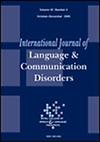Aphasia severity and factors predicting language recovery in the chronic stage of stroke
Abstract
Background
It is assumed that language impairments post-stroke do not show much improvement after the phase of spontaneous recovery, especially in the chronic stage. Several studies have reported language recovery and factors influencing it in the acute stages of stroke. There is limited literature focusing on language recovery in the chronic stages of stroke, especially in the Indian population, and the demographic, lesion- and aphasia-related factors that contribute towards language recovery in the chronic stages are poorly understood.
Aims
To assess changes in aphasia severity at two time points in the chronic stage and to identify the factors (demographic, lesion- and aphasia-related) predicting language recovery in chronic stroke aphasia.
Methods & Procedures
In this cross-sectional study, 22 individuals with chronic stroke aphasia underwent the baseline language assessment (T1) using Western Aphasia Battery (WAB) at least 2 or more months post-onset. A follow-up language assessment (T2) for the same individuals was conducted 3–12 months post-baseline assessment. The mean age of the participant group was 48.18 years (SD = 13.05) with a corresponding mean year of education of 9.18 (SD = 5.81). 81.8% of the participants (N = 18) were male and majority of them belonged to the lower middle socio-economic status (N = 9, 40%).
Outcomes & Results
There was a significant change in mean language subdomain and aphasia quotient scores of WAB between two time points (p = 0.000). The majority showed a significant improvement in their AQ scores (WAB-SEM 2.5) in the absence of speech therapy. Socio-economic status (p = 0.005) and aphasia severity (AQ1) at baseline (p = 0.000) were significant in predicting language recovery.
Conclusions & Implications
Significant language recovery occurs in the chronic stage of stroke, which is predicted by socio-economic status and aphasia severity at baseline assessment. This study will provide clinicians with an insight into language recovery in chronic stroke aphasia and help serve as a guide for evidence-based prognostic statements. These findings encourage patients with aphasia to seek speech and language therapy in the chronic stage of stroke.
WHAT THIS PAPER ADDS
What is already known on the subject
- A number of studies have reported language recovery occurring in the acute stages of post-stroke aphasia and the factors predicting it. There is limited literature focusing on language recovery occurring between two time points in the chronic stages of stroke especially in the Indian population, and the demographic, lesion- and aphasia-related factors that contribute towards it are poorly understood.
What this paper adds to the existing knowledge
- Language recovery occurs in the chronic stage of stroke aphasia and is predicted by socio-economic status and aphasia severity at baseline assessment. In our study, language recovery was found to take place even in the absence of formal speech and language intervention, thus indicating that spontaneous recovery continues well into the chronic stage as well.
What are the potential or actual clinical implications of this study?
- This study will provide clinicians with an understanding of the language recovery occurring in chronic stroke aphasia as well as the factors influencing recovery, thus serving as a guide for evidence-based prognostic statements. Evidence of language recovery in the chronic stage will encourage patients to attend intensive speech and language therapy in this stage resulting in significant improvement in language functions.

 求助内容:
求助内容: 应助结果提醒方式:
应助结果提醒方式:


